by Mike Plambeck

Who wouldn’t want to own a house in California, especially in beautiful San Jose? Well, we all know how that goes, right? High cost of living, lack of affordable housing – especially if you have bad credit, the dream of home ownership in this state can feel like something that shouldn’t even be attempted.
But don’t worry – we’re called Home Loans For All because we truly believe that everyone can find a loan no matter what their credit looks like, which is why today we’ll be discussing how you can find bad credit home loans in San Jose, California.
A lot of people ask us: why is credit so important anyway? Well, your FICO credit score is a measurement of your payment history and credit utilization.
Get Help Pre Qualifying for a San Jose Bad Credit Home Loan – Click Here!
It tells potential bad credit mortgage brokers in San Jose how likely you are to make the monthly payments on your mortgage – and therefore, how likely a lender is to get back any money they lend you, which is always their primary concern.
Your credit score is also closely connected to your debt-to-income ratio, a comparison of the amount of debt you have accumulated in student loans, auto loans, and pre-existing mortgages to your current gross income.
Most lenders like to see your debt take up no more than forty percent of your gross income. If you’re not utilizing all of your credit, it will improve your FICO score AND your D-I ratio.
I Have Bad Credit In San Jose. What Now?
Don’t worry, dear reader – you can still find bad credit home loans in San Jose through state and local programs, federal loan options like FHA and VA loans, or through other means. Your dream of home ownership isn’t over yet!
Government Programs
Housing Trust Silicon Valley
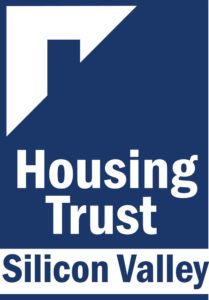
We’ve written in the past about the types of resources that are offered by the state of California, including CalHFA programs and CalVet Home Loans.
But if you want some assistance specific to San Jose, consider reaching out to the Housing Trust Silicon Valley (yes, I agree, that name really is backwards).
They offer a number of down payment assistance programs to low and moderate income first-time home buyers in San Jose, which are often helpful when dealing with the higher down payments of a bad credit home loan.
Federal Programs
State programs are great for down payment assistance, but they’re not necessarily going to help you find a bad credit mortgage in San Jose. For that, you might need to start looking at loans
that are insured by the federal government, which have more favorable terms and lower income requirements.
FHA Loans
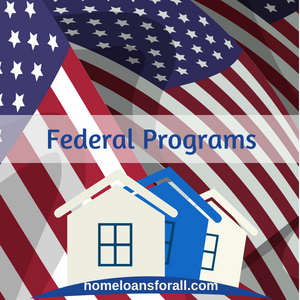
FHA loans are still given out by a private lender, but they are insured by the Federal Housing Administration of the United States government.
This means that lenders are willing to consider applicants who might otherwise be rejected outright and will offer more lenient terms to those they do accept. After all, the government’s absorbing the risk!
FHA loans have no minimum credit requirements, making them the most popular and arguably most accessible bad credit home loan in San Jose. However, in order to qualify for the lowest possible down payment (3.5 percent) you’ll need a credit score of 580 or higher.
In cases where a San Jose buyer has credit under 580, the borrower will need to make a 10 percent down payment or provide alternative forms of credit.
VA Loans
VA loans are a lot like the FHA loan option. They’re insured by a branch of the federal government (in this case, the Department of Veterans’ Affairs.) They have easier down payments – in fact, VA loans don’t require a down payment at all. And they have no minimum credit requirement.
But there’s another big advantage, which is that VA loans don’t require you to pay Private Mortgage Insurance (PMI), which FHA loans require you to do for the entirety of the mortgage period. This means that these loans aren’t just easier to secure – they will likely save you thousands of dollars over time.
Rent To Own Options in San Jose

If you’re not ready, not able, or just not interested in trying to apply for a government-insured bad credit home loan in San Jose at this point, you might consider a rent-to-own contract instead.
This option is exactly what it sounds like – you apply for a rent-to-own property just as you would for any other rental contract, which means lower credit requirements.
At the beginning of your lease, you’ll have to pay a potential options fee much like you’d pay a down payment on a typical bad credit mortgage in San Jose.
Then, throughout the course of your lease, a portion of your monthly payment will be applied towards the principal of the home.
You can start living in the property now, rebuilding your credit, and saving up for the financing you’ll need to find to buy the property outright once the rental period has ended.
Cosigner on a Home Loan
First time buyers – especially younger first-time buyers like college graduates – will often seek the help of a cosigner on their San Jose home loan. A cosigner lets you apply for the loan with their credit score (or at least with a boost to your own) which will get you better interest rates and a better chance of actually getting accepted.
However, the cosigner also assumes much of the responsibility for the payments, so make sure you’re only co-signing with someone you trust.
First Time San Jose Buyers With Bad Credit

First time home buyers who have bad credit in San Jose will probably get the most utility from the FHA home loan. This loan is specifically designed for first-time buyers.
Furthermore, people whose credit score, debt-to-income ratio, or other considerations would normally disqualify them from getting a San Jose mortgage can usually get accepted for the FHA home loan (which has no minimum credit requirement at all!)
Bad Credit Home Loans In San Jose After Bankruptcy
If you fail to make a payment on a mortgage, your house may be foreclosed upon or you may have to file for bankruptcy. Either option will have a huge detrimental impact on your credit score. And even worse: conventional mortgages require you to wait seven years after filing for bankruptcy before you can apply for a new loan.
Fortunately, bad credit home loans in San Jose require you to be a lot less patient. FHA loans only require a three-year waiting period while VA loans need even less time – a two year waiting period.
During your wait, you can take steps to rebuild your credit so that you can qualify for better interest rates and terms on your next San Jose bad credit mortgage.
Loan Assistance Available In San Jose
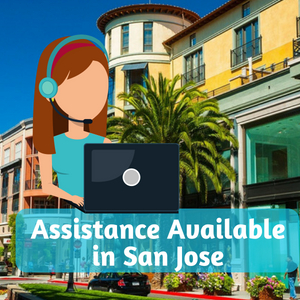 c
c
If you’re going to be purchasing a new home in San Jose, you should take advantage of all the assistance available to you. HUD-approved counseling agencies are a good place to start, as they can answer specific questions about your particular situation better than we can. CalHFA may also be offering home buyer assistance in the San Jose area.
Homestead Tax Credit
The homestead tax credit is a useful way to make a property purchased with a San Jose bad credit home loan more affordable in the future. The San Jose homestead tax exemption allows you to withhold a certain amount of money (either a flat dollar amount or a percentage of the home’s value) from your property taxes if you live in a home that you’re still paying off.
How To Improve Your Credit Score
Credit repair can take a long time sometimes, and a lot of people will say that you can’t do it without the help of a credit repair agency. But that’s not true. There’s nothing such an agency can do for you that you can’t already do on your own, because all “credit repair” is is proving that you are a trustworthy borrower.
The first thing you need to do if you have bad credit in San Jose is to just pay your bills on time every month. This action shows potential lenders that you are a secure financial investment and that you can be trusted to make payments on a San Jose bad credit home loan.
The second important piece of credit repair is paying off as many of your existing debts as you can. In addition to improving your credit score, this also improves your debt-to-income ratio.
Conclusion
Well, there you have it. Hopefully you now have everything you need to find a bad credit home loan in San Jose and can start living your best life in a dream home in this beautiful city. Remember: a home isn’t just a place to live, it’s a valuable long-term asset that will appreciate over time. So find yours today!
by Mike Plambeck
Common Mistakes Made by First-Time Home Buyers
 You can avoid the cycle of making the same mistake when taking a first time home buyer loan that your forefathers made when they first bought a house if you follow an expert’s advice. Before you fulfill your dream of being a homeowner, there are important steps you must not skip. If you have found the ideal location, hunting for a house is not a walk in the park. It entails more than finding an alluring curb appeal and great interiors. Before you go to a lender, make sure that you have been pre-approved. The best professional to consult is a mortgage broker to help you find a home you can afford and from the right lender. Once you find the right broker, avoid any faux pas.
You can avoid the cycle of making the same mistake when taking a first time home buyer loan that your forefathers made when they first bought a house if you follow an expert’s advice. Before you fulfill your dream of being a homeowner, there are important steps you must not skip. If you have found the ideal location, hunting for a house is not a walk in the park. It entails more than finding an alluring curb appeal and great interiors. Before you go to a lender, make sure that you have been pre-approved. The best professional to consult is a mortgage broker to help you find a home you can afford and from the right lender. Once you find the right broker, avoid any faux pas.
1. Overlooking the cost of home ownership
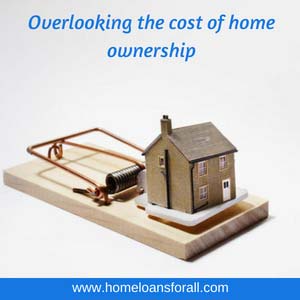 Most first-time mortgage applicants consider buying a home when they think they are set for mortgage payments. Just because you can afford the monthly repayments doesn’t mean you can afford to be a homeowner. Home ownership entails more than just paying the interest and monthly instalments. There are other bills that will continue pilling up if you don’t plan for them well in advance. You might be surprised how costly it is being a homeowner if you are not prepared. You will need to pay for then gas, oil, power, maintenance, taxes, insurance, etc. These are some of the costs your lender doesn’t give a hoot about once you qualify for a mortgage. These are the same bills that renters pay but your new house might have higher costs and completely new bills like homeowner association fees. To avoid falling into the mistake of miscalculating the real cost of a homeowner, seek advice from seasoned investors and fellow homeowners. Even a mortgage consultant can clarify for you the costs to expect such as insurance and property taxes. Don’t forget to check the utility bills of your potential home for the last one year to know how much you will be paying after moving in.
Most first-time mortgage applicants consider buying a home when they think they are set for mortgage payments. Just because you can afford the monthly repayments doesn’t mean you can afford to be a homeowner. Home ownership entails more than just paying the interest and monthly instalments. There are other bills that will continue pilling up if you don’t plan for them well in advance. You might be surprised how costly it is being a homeowner if you are not prepared. You will need to pay for then gas, oil, power, maintenance, taxes, insurance, etc. These are some of the costs your lender doesn’t give a hoot about once you qualify for a mortgage. These are the same bills that renters pay but your new house might have higher costs and completely new bills like homeowner association fees. To avoid falling into the mistake of miscalculating the real cost of a homeowner, seek advice from seasoned investors and fellow homeowners. Even a mortgage consultant can clarify for you the costs to expect such as insurance and property taxes. Don’t forget to check the utility bills of your potential home for the last one year to know how much you will be paying after moving in.
2. House hunting before pre-approval
Before you get excited about a particular house in your favorite location, get pre-approved first to see if you can afford. Shopping for a home sounds like a fun activity; wait until you start analyzing your financial position with a lender and that is when you realize that the mortgage journey is not a walk in the park. And that is where most first-time home buyers go wrong- starting with the house hunt and end up getting disappointed learning that they can’t afford the first house they spotted. To escape this miscalculation, find out first the amount of home loan you can afford and start searching for homes in that price range. Only then can you make a confident offer. That is why you need a pre-approval to weigh your debts and expenses against your salary. You must demonstrate to a lender that you’re capable of backing up the offer. Unless you have sufficient funds to buy a home in cash, you should start with getting pre-approved and search for a house later.
3. Disregarding the neighborhood and location
Before you shop for a house, jot down the most attractive qualities of your ideal home. Don’t settle for the first appealing qualities and forget the most important ones like proximity to your job. Another thing you must not ignore is the neighborhood drawbacks. Can you put up with a noisy children’s park behind your home or a stinking dumpsite a few meters away? You might also think that commuting is not an issue but after a few months of spending thousands on fuel and traffic delays, you will regret buying a home too far from your workplace. How can you avoid this mistake? Before making an offer, visit the house and check the downsides of the neighborhood.
4. Skipping professional advice
 Look for independent mortgage brokers who will not give biased recommendations. Avoid working with the real estate agent of the seller because they will sugar-coat the deal just to secure a good price. When making negotiations, you might be overmatched by a seasoned agent who works in the interest of the home seller. You need someone who will favor your interest and who better than a mortgage advisor or broker. Without professional help, you will be confused by sassy real estate agents as well as overhyped mortgage deals. As a rule of thumb, never buy a house on your own for the first time. Suppose you are divorced. You wouldn’t go seeking advice from your ex-husband. Similarly, reaching out to a single real estate agent gives you limited options because they will suggest only the homes that are in their listings. Consider checking with different realtor companies to find a wide range of houses that suit your budget. Ask your friends and family for referrals. And when you find a good agent, ask for references from previous home buyers. Do the same thing with mortgage brokers.
Look for independent mortgage brokers who will not give biased recommendations. Avoid working with the real estate agent of the seller because they will sugar-coat the deal just to secure a good price. When making negotiations, you might be overmatched by a seasoned agent who works in the interest of the home seller. You need someone who will favor your interest and who better than a mortgage advisor or broker. Without professional help, you will be confused by sassy real estate agents as well as overhyped mortgage deals. As a rule of thumb, never buy a house on your own for the first time. Suppose you are divorced. You wouldn’t go seeking advice from your ex-husband. Similarly, reaching out to a single real estate agent gives you limited options because they will suggest only the homes that are in their listings. Consider checking with different realtor companies to find a wide range of houses that suit your budget. Ask your friends and family for referrals. And when you find a good agent, ask for references from previous home buyers. Do the same thing with mortgage brokers.
5. Applying for another loan before losing the mortgage deal
Opening new credit card accounts or taking auto loans before the deal is closed is a grievous mistake. The time lag between mortgage application and getting the keys to your home is critical. If you have poor credit habits, you might want to put away your credit card and stop buy unnecessary stuff that will increase your credit balances. You must wait until the deal is done to charge huge sums on your credit accounts. The reason you should watch out how you spend is that the mortgage lender takes into consideration your credit score as well as the DTI ratio. You don’t want to reduce your credit score or increase the DTI. Just before closing, the lender will check your credit rating for the last time and might change their mind if your credit is poor.
Conclusion
When buying your first home, it is normal not to have a clue of where to begin. Newbies are prone to mistakes but you don’t have to follow suit. You can find your best mortgage deal today with the help of an expert. Don’t forget to visit homeloansforall.com to find out the fundamental steps to buying your first house as well as the current market rates. Check out how much mortgage you can afford.
by Mike Plambeck
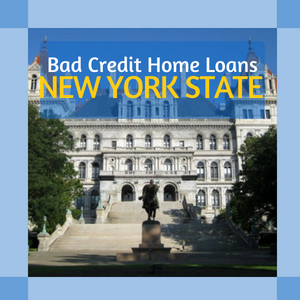 Home ownership is something we all want, but applying for a loan is often difficult and disheartening, especially when you have bad credit. That’s why today we’re going to be looking at some of the best bad credit home loans in New York state – programs you can apply for, agencies that can help, and alternate options for those whose credit is just too low for even the most lenient housing initiatives.
Home ownership is something we all want, but applying for a loan is often difficult and disheartening, especially when you have bad credit. That’s why today we’re going to be looking at some of the best bad credit home loans in New York state – programs you can apply for, agencies that can help, and alternate options for those whose credit is just too low for even the most lenient housing initiatives.
To understand how to get a home loan, you need to understand the criteria that lenders look at when deciding to approve or reject an application. The first is your FICO credit score, a measurement determined in large part by your payment history and credit utilization.
Get Help Pre Qualifying for a New York State Low Credit Home Loan – Click Here!
The second is your debt-to-income ratio, which is a measure of the amount of outstanding debt you have compared to your total gross income. These measurements show how likely you are to pay back the money that the bank is lending you, which is why they’re such important deciding factors for lenders in the state of New York.
I Have Bad Credit In New York. What Now?
Once your credit score has dropped to the point where it’s considered “bad credit,” it will take a long time to rebuild it. We’ll discuss the steps you can take to do so later in this article, but in the meantime you need a place to live, and that means securing a bad credit home loan in New York. There are several state and federal government programs that can help you in this endeavor:
Government Programs
OPWDD Housing Initiatives
 New York’s Office for People With Developmental Disabilities offers a number of housing initiatives based on the individual needs of their applicants. Their Home of Your Own, or HOYO, program lets income-eligible first-time homebuyers purchase their own homes with a generous subsidy that won’t take credit into account.
New York’s Office for People With Developmental Disabilities offers a number of housing initiatives based on the individual needs of their applicants. Their Home of Your Own, or HOYO, program lets income-eligible first-time homebuyers purchase their own homes with a generous subsidy that won’t take credit into account.
Of course, in order to take advantage of this resource you must have an intellectual or developmental disability, but it’s wonderful that our great state offers these kinds of resources to those in need.
They also offer Individualized Residential Alternatives and family care services to help those with disabilities.
Neighborhood Housing Services of NYC (NHSNYC)
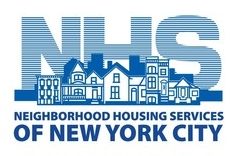 New York City’s Neighborhood Housing Services program allows owners of one- to four-family homes to apply for low-interest home loans. They offer subsidies on home loans for first-time home owners, and should be the first point of contact for anyone who’s looking for a bad credit home loan in New York. Of course, this organization can’t do anything for you if you live outside of the five boroughs.
New York City’s Neighborhood Housing Services program allows owners of one- to four-family homes to apply for low-interest home loans. They offer subsidies on home loans for first-time home owners, and should be the first point of contact for anyone who’s looking for a bad credit home loan in New York. Of course, this organization can’t do anything for you if you live outside of the five boroughs.
Federal Programs
Since New York’s state-level home ownership programs are very limited in scope and will only be available to a few home owners, most of our readers will probably need to turn to a federal program that’s designed to help buyers find a home loan in New York with bad credit.
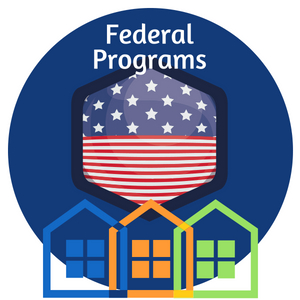
FHA Loans
FHA loans are the most popular form of home loan in the country. While these mortgages are still paid out by banks or private moneylenders, they are insured by the Federal Housing Administration – an agency of the federal government.
Because of this insurance, lenders feel much more comfortable accepting loan applications they would otherwise reject, and FHA loans usually have down payments of just 3.5 percent and low minimum credit requirements.
Read our article about FHA Loans in New York here.
VA Loans
If you are an eligible service member or veteran, you should consider applying for a VA loan. These mortgages don’t require you to pay private mortgage insurance or the initial down payment, which will save you a lot of money.
And like the FHA loan, VA loans have no minimum credit requirement, making this the best bad credit home loan available in New York state if you can get it.
USDA Loans
Rural home owners may be able to apply for a loan through the United States Department of Agriculture, which can be manually underwritten into a bad credit home loan in New York by the lender.
This option obviously does not apply to those living in the city, but this could be a good option for those elsewhere in the state!
Rent To Own Options in New York State
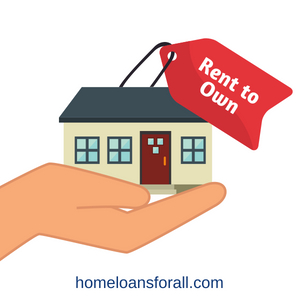 If you can’t apply for a home loan just yet, you might want to consider a rent-to-own situation. In this option, you only have to apply for a rental contract, which will have a much lower credit requirement (and much lower requirements in general) than a mortgage.
If you can’t apply for a home loan just yet, you might want to consider a rent-to-own situation. In this option, you only have to apply for a rental contract, which will have a much lower credit requirement (and much lower requirements in general) than a mortgage.
But by paying a potential options fee up front, you can have a certain portion of your monthly rent check put towards the principle of the home and be given the chance to buy the property outright once the lease is up.
At that point, you will have to find some kind of additional funding to finalize financing the remaining balance of the home. But at least you’ll have a place to live while you save up for the full purchase and work to rebuild your credit.
Cosigner on a Home Loan
Another option for those who are unable to apply for a government program is to ask a trusted friend or family member to co-sign the loan with them. This means that they accept full responsibility for your property and your ongoing payments.
In exchange, you can apply for the loan as though your credit score was the same as theirs in order to achieve more favorable terms.
This is a big commitment and something you should only ask of someone you really trust. Cosigning is a popular option for college graduates and younger buyers, who will often have their parents co-sign for them.
First Time Buyers In New York With Bad Credit
First-time buyers in New York who have bad credit usually prefer the FHA loan option – in fact, it’s specifically designed to help people in that position! This program makes buying a home a lot easier by lowering the downpayment from 20 percent to 3.5 percent if you have a credit score of 580 or higher.
If you have lower credit than that, you can still often get a loan by either agreeing to pay a larger down payment of 10 percent or by providing alternative forms of credit.
Bad Credit Home Loans In New York After Bankruptcy
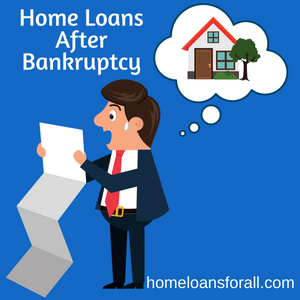 If you can’t make a payment on a mortgage, you will either have to file for bankruptcy or allow your house to be foreclosed upon. Either event will have a tremendous impact on your credit rating and will affect your ability to apply for another home loan in the future.
If you can’t make a payment on a mortgage, you will either have to file for bankruptcy or allow your house to be foreclosed upon. Either event will have a tremendous impact on your credit rating and will affect your ability to apply for another home loan in the future.
A conventional loan will require you to wait seven years between filing for bankruptcy and applying for a new mortgage. But loans acquired through government home ownership programs have much more lenient waiting periods.
FHA loans only have a three-year waiting period, while VA loans only have a two-year wait. This can be a major benefit of bad credit home loans in New York state.
Also, those two-to-three years may still seem like a lot, but it’s the perfect opportunity to start rebuilding your credit.
Assistance Available In New York State
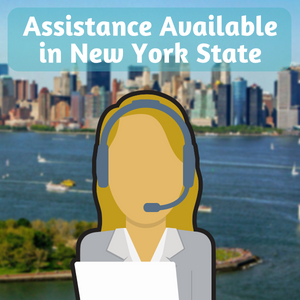
If you’re looking to buy a new home, reading one article on the Internet isn’t going to be enough preparation. You need to take advantage of all the home loan assistance available in New York.
HUD-approved housing counseling agencies are a great way to learn more, as is the NYC Neighborhood Housing Services program if you live in the city. Go to seminars, ask questions, and get advice on what option is going to be the best for your particular situation.
New York Homestead Tax Credit
The homestead tax exemption allows you to withhold a certain amount of money from your property taxes if you live in a home that you’re still paying off. This might be a flat dollar amount or a percentage of the home’s value.
In addition to the homestead credit, which is available in a lot of states, the state of New York also gives an exemption to elderly homeowners with incomes lower than $80,000 USD.
How To Improve Your Credit Score in New York
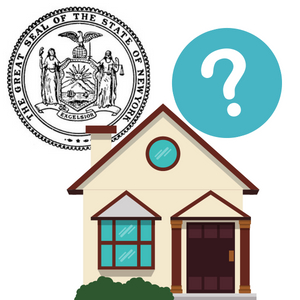 Government programs, rent-to-own, co-signing loans, etc. are all great ways to find bad credit home loans in New York state. But you should still take steps to repair your credit so that these alternatives aren’t as necessary in the future.
Government programs, rent-to-own, co-signing loans, etc. are all great ways to find bad credit home loans in New York state. But you should still take steps to repair your credit so that these alternatives aren’t as necessary in the future.
Besides, you should get started now – credit repair takes a long time, although the exact amount of time depends on the damage that’s been done, whether or not you’ve ever filed for bankruptcy in the past, and other factors that will vary from person to person.
The first thing you need to do is just pay your bills on time every month, as well as your new mortgage payments and any other regular debts you have to deal with. This action shows potential lenders that you are a reliable investment who can be trusted to make payments, and will therefore help improve your credit score.
The second important piece of credit repair is paying off as many of your existing debts as you can. In addition to improving your credit score, this also improves your debt-to-income ratio.
Conclusion
Hopefully you’ve learned a bit about how to find bad credit home loans in New York. At Home Loans For All we want everyone to be able to find a house to call their own regardless of their credit or income. So be consistent with your bills, seek out helpful programs like the FHA loan and the other options we talked about above, and start finding your dream home today!





 c
c
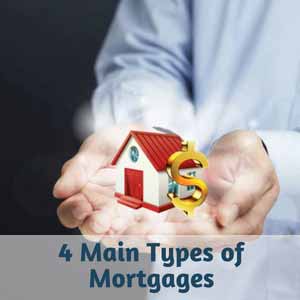 One of the commonly asked questions by new home buyers is “what are the various types of mortgages available in Canada?” If you have the same question in mind, then you have come to the right place for answers. As soon as you jump start on mortgage search, you will realize that the options are overwhelming and you might want to hire a professional broker to help you with the application process. Your goal is to choose the best which doesn’t necessarily mean the cheapest in the market. There are other factors that come into play besides the interest rate. To clear your doubts, start by understanding how home loans work and the different types available.
One of the commonly asked questions by new home buyers is “what are the various types of mortgages available in Canada?” If you have the same question in mind, then you have come to the right place for answers. As soon as you jump start on mortgage search, you will realize that the options are overwhelming and you might want to hire a professional broker to help you with the application process. Your goal is to choose the best which doesn’t necessarily mean the cheapest in the market. There are other factors that come into play besides the interest rate. To clear your doubts, start by understanding how home loans work and the different types available. Like the name would lead you to believe, this is a type of loan whereby you only pay the interest every month. You repay the capital at the end of the amortization with funds you should have saved elsewhere. As you can see, it differs from the repayment mortgage in that you must provide sufficient money to cover the entire debt at the end of the mortgage journey. You might use your inheritance money or save in some ways. Either way, you must be sure that you will have the full amount at the end of amortization. If you fail to repay the full amount, your lender might foreclose your house. But you’ll be lucky if the home value has appreciated so that you can pay off the loan with the extra value.
Like the name would lead you to believe, this is a type of loan whereby you only pay the interest every month. You repay the capital at the end of the amortization with funds you should have saved elsewhere. As you can see, it differs from the repayment mortgage in that you must provide sufficient money to cover the entire debt at the end of the mortgage journey. You might use your inheritance money or save in some ways. Either way, you must be sure that you will have the full amount at the end of amortization. If you fail to repay the full amount, your lender might foreclose your house. But you’ll be lucky if the home value has appreciated so that you can pay off the loan with the extra value.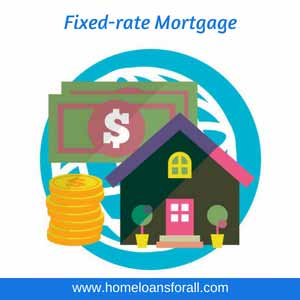
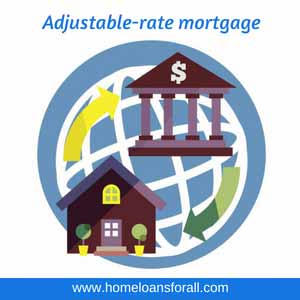 a. Standard variable mortgage
a. Standard variable mortgage You can avoid the cycle of making the same mistake when taking a first time home buyer loan that your forefathers made when they first bought a house if you follow an expert’s advice. Before you fulfill your dream of being a homeowner, there are important steps you must not skip. If you have found the ideal location, hunting for a house is not a walk in the park. It entails more than finding an alluring curb appeal and great interiors. Before you go to a lender, make sure that you have been pre-approved. The best professional to consult is a mortgage broker to help you find a home you can afford and from the right lender. Once you find the right broker, avoid any faux pas.
You can avoid the cycle of making the same mistake when taking a first time home buyer loan that your forefathers made when they first bought a house if you follow an expert’s advice. Before you fulfill your dream of being a homeowner, there are important steps you must not skip. If you have found the ideal location, hunting for a house is not a walk in the park. It entails more than finding an alluring curb appeal and great interiors. Before you go to a lender, make sure that you have been pre-approved. The best professional to consult is a mortgage broker to help you find a home you can afford and from the right lender. Once you find the right broker, avoid any faux pas. Most first-time mortgage applicants consider buying a home when they think they are set for mortgage payments. Just because you can afford the monthly repayments doesn’t mean you can afford to be a
Most first-time mortgage applicants consider buying a home when they think they are set for mortgage payments. Just because you can afford the monthly repayments doesn’t mean you can afford to be a  Look for independent mortgage brokers who will not give biased recommendations. Avoid working with the real estate agent of the seller because they will sugar-coat the deal just to secure a good price. When making negotiations, you might be overmatched by a seasoned agent who works in the interest of the home seller. You need someone who will favor your interest and who better than a mortgage advisor or broker. Without professional help, you will be confused by sassy real estate agents as well as overhyped mortgage deals. As a rule of thumb, never buy a house on your own for the first time. Suppose you are divorced. You wouldn’t go seeking advice from your ex-husband. Similarly, reaching out to a single real estate agent gives you limited options because they will suggest only the homes that are in their listings. Consider checking with different realtor companies to find a wide range of houses that suit your budget. Ask your friends and family for referrals. And when you find a good agent, ask for references from previous home buyers. Do the same thing with mortgage brokers.
Look for independent mortgage brokers who will not give biased recommendations. Avoid working with the real estate agent of the seller because they will sugar-coat the deal just to secure a good price. When making negotiations, you might be overmatched by a seasoned agent who works in the interest of the home seller. You need someone who will favor your interest and who better than a mortgage advisor or broker. Without professional help, you will be confused by sassy real estate agents as well as overhyped mortgage deals. As a rule of thumb, never buy a house on your own for the first time. Suppose you are divorced. You wouldn’t go seeking advice from your ex-husband. Similarly, reaching out to a single real estate agent gives you limited options because they will suggest only the homes that are in their listings. Consider checking with different realtor companies to find a wide range of houses that suit your budget. Ask your friends and family for referrals. And when you find a good agent, ask for references from previous home buyers. Do the same thing with mortgage brokers. Home ownership is something we all want, but applying for a loan is often difficult and disheartening, especially when you have bad credit. That’s why today we’re going to be looking at some of the best bad credit home loans in New York state – programs you can apply for, agencies that can help, and alternate options for those whose credit is just too low for even the most lenient housing initiatives.
Home ownership is something we all want, but applying for a loan is often difficult and disheartening, especially when you have bad credit. That’s why today we’re going to be looking at some of the best bad credit home loans in New York state – programs you can apply for, agencies that can help, and alternate options for those whose credit is just too low for even the most lenient housing initiatives. New York’s Office for People With Developmental Disabilities offers a number of housing initiatives based on the individual needs of their applicants. Their Home of Your Own, or HOYO, program lets income-eligible first-time homebuyers purchase their own homes with a generous subsidy that won’t take credit into account.
New York’s Office for People With Developmental Disabilities offers a number of housing initiatives based on the individual needs of their applicants. Their Home of Your Own, or HOYO, program lets income-eligible first-time homebuyers purchase their own homes with a generous subsidy that won’t take credit into account. New York City’s Neighborhood Housing Services program allows owners of one- to four-family homes to apply for low-interest home loans. They offer subsidies on home loans for first-time home owners, and should be the first point of contact for anyone who’s looking for a bad credit home loan in New York. Of course, this organization can’t do anything for you if you live outside of the five boroughs.
New York City’s Neighborhood Housing Services program allows owners of one- to four-family homes to apply for low-interest home loans. They offer subsidies on home loans for first-time home owners, and should be the first point of contact for anyone who’s looking for a bad credit home loan in New York. Of course, this organization can’t do anything for you if you live outside of the five boroughs.
 If you can’t apply for a home loan just yet, you might want to consider a rent-to-own situation. In this option, you only have to apply for a rental contract, which will have a much lower credit requirement (and much lower requirements in general) than a mortgage.
If you can’t apply for a home loan just yet, you might want to consider a rent-to-own situation. In this option, you only have to apply for a rental contract, which will have a much lower credit requirement (and much lower requirements in general) than a mortgage. If you can’t make a payment on a mortgage, you will either have to file for bankruptcy or allow your house to be foreclosed upon. Either event will have a tremendous impact on your credit rating and will affect your ability to apply for another home loan in the future.
If you can’t make a payment on a mortgage, you will either have to file for bankruptcy or allow your house to be foreclosed upon. Either event will have a tremendous impact on your credit rating and will affect your ability to apply for another home loan in the future.
 Government programs, rent-to-own, co-signing loans, etc. are all great ways to find bad credit home loans in New York state. But you should still take steps to repair your credit so that these alternatives aren’t as necessary in the future.
Government programs, rent-to-own, co-signing loans, etc. are all great ways to find bad credit home loans in New York state. But you should still take steps to repair your credit so that these alternatives aren’t as necessary in the future.








